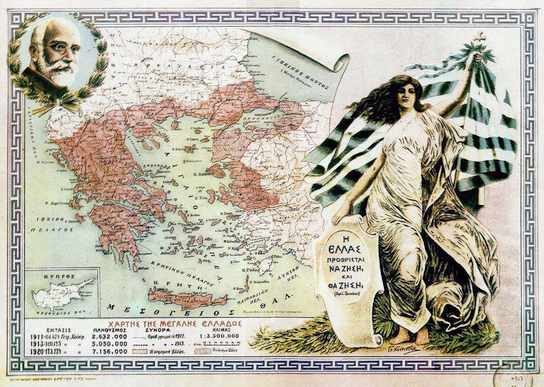- About Us
- Latest News
- Calendar
- Education
- School History
- ELA - For Toddlers
- Greek as a Second Lang.
- Greek as a Primary Lang.
- Conversational Skills (Online)
- Online Greek Courses
- Greek for Adults
- Ancient Greek
- Open Seminars
- Creative Drama
- Traditional Greek Dance
- Apply to Teach
- Holiday Program Enrolment
- Excursion - Museum
- School Polo Order Form
- Parent Notice to School
- Community Churches
- Membership
- Greek Centre
Greek Orthodox Community of Melbourne and Victoria
Event

- Title:
- The Great Idea: Greek Irredentism and Slavo-Macedonism
- When:
- 04.09.2014 19.00 h
- Where:
- The Ithacan Philanthropic Society - Melbourne
- Category:
- Education
Description
Presenter: Dimitris Gonis
Entry: Free
Synopsis
The French Revolution literally woke the Balkan peoples from their slumber.
When the 19th century arrived, the Greeks were in the best position to establish their nation-statehood. Their diachronic historico-cultural, linguistic and ecclesiastical pre-eminence allowed them to embark upon their nation-building project with a legitimacy that later Balkan nationalisms did not have.
The Greece of the late 18th and early 19th century did not only represent the vision of Greeks both in and outside Greece, but was also inspired by the romanticism and reverence with which the West in general viewed Hellenic civilisation.
Within the new nation-state Homer, Aristotle, Alexander and Byzantium were to be resurrected as part of the civilised world's duty. The irredentism of the Great Idea, in a sense emerged out of a 'cultural arrogance' which was to inevitably clash with the national and political aims of the other Balkan peoples.
It was this perceived cultural superiority in conjunction with the rampant 19th century Balkan nationalism that gave rise to 'Slavo-Macedonism' as an expression of anti-Hellenism. The 'Slavo-Macedonist' and therefore 'Slavo-Macedonism' essentially emerged as a reaction to Hellenisation and its historic, linguistic and ecclesiastical exclusion of 'the other'.
Although the talk presents a brief, diachronic overview of 'Greekness', it essentially focuses on the period between Rigas Feraios' Hellenic Republic (1797) and the end of the Great Idea with the Treaty of Lausanne (1923). Included in this period is the birth of Slavo-Macedonism, its first articulators and its ideologue, Krste Missirkov.
Biography
Dimitri Gonis was born in Melbourne but grew up in Messinia, Greece.
He is currently writing his PhD thesis in Greek Studies at La Trobe University. His work focuses on the role of memory in the construction of Macedonian identities in Australia.
Since 2011 he has taught Modern Greek, Trans-territorial Hellenism as well as Ethnic and Civil Conflict in Southern Europe and in Cyprus in the School of Historical and European Studies at La Trobe University. Dimitri is also a translator as well as the author of published poetry, articles and one book (The Cactus King, 1999).
Sponsors
We would like to thank Costas Dimaras for sponsoring tonight’s lecture. Such initiatives assist us in providing these lectures free to the public. If you would like to participate as a sponsor from as little as $100 please send us an email: This e-mail address is being protected from spambots. You need JavaScript enabled to view it
We would also like to thank our corporate sponsor:

Venue
- Venue:
- The Ithacan Philanthropic Society - Website
- Street:
- Level 2, 329 Elizabeth Street
- Postcode:
- 3000
- Suburb:
- Melbourne
- State:
- VIC
- Country:
-

In October 1916, the Ithacan migrants of Melbourne established the ITHACAN PHILANTHROPIC SOCIETY "The Ulysses", with an inaugural membership of some 153 members. This was in response to pleas for aid from their loved ones in Ithaca who were suffering deprivation during the First World War.
Over the years, however, the Society has been much more than just a philanthropic institution. It has been a constant in the lives of the early Ithacan migrants replacing the homeland which they had left.
The Society takes an active role in the cultural, social, educational and quality of life interests of the Ithacan Community. The Society, as part of its philanthropic role, also makes many monetary contributions to worthy causes, including those outside the immediate Ithacan community. The Society celebrated its 90th Anniversary in 2006.
EventList powered by schlu.net



